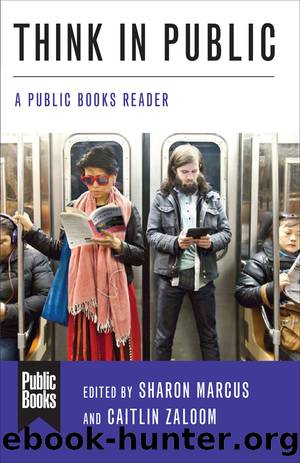Think in Public by Sharon Marcus

Author:Sharon Marcus
Language: eng
Format: epub
Publisher: Columbia University Press
CAN THERE BE A FEMINIST WORLD?
GAYATRI CHAKRAVORTY SPIVAK
The following is the lightly edited text of a lecture delivered on November 16, 2013, at the Columbia University Global Center in Amman, Jordan.
I am pleased to be here at the Columbia Global Center in Amman. I lunched with the vice president for Global Centers three days ago and told him, only half in jest, that I was going to enjoy Amman more without him. I explained that I wanted to make new friends here, rather than be guided affectionately by him, by now an old friend.
Yet my experience in Jordan is not quite new. In the fall of 1980, I taught for three weeks at the Womenâs Section of the University of Riyadh. There were students from all over the area, and some of them were from Jordan. Those young women would be in their fifties now. I do not expect anybody from that group to be here today. Yet among my dearest memories from that outstanding experience are our conversations in the free periods on the rooftop behind the water tank, agitated and real, where we tossed around in urgent whispers the question raised for you today: Not just can, but how can there be a feminist world? Some of my dearest interlocutors were the young women from Jordan. Tonight I continue that earlier conversation, and I can only imagine the difference between those conversations and todayâs conversations.
(Between then and now, I have delightedly encountered one of those allies from the water tank! Moneera Al-Ghadeer, colleague, author of Desert Voices: Bedouin Womenâs Poetry in Saudi Arabia.)
And yet, for many women in our shared world, have things changed?
I am a teacher of the humanities. I do not directly influence state policy. Humanities teachers are like personal trainers in the gym of the mind. They believe that unless this work is done at the same time as agitating for merely legal change, generation after generation, persistently, supplemented by rearranging the desires of people, nothing can succeed. In the long run, if laws have to be constantly enforced on the majority, without any change in how people really think about rape, honor killings, gender discrimination in generalâand I mean people, men and womenâthe laws become useless, ways of dodging them proliferate, and force takes over: not a feminist world. Short-term problem solving should not be stopped. There are too many problems. But the kind of work we do, silent work, quiet work, slow work, is the work that sustains everything. âPublic awarenessâ preaches to the choir, at best makes the choir a bit larger. âSustainableâ is used only in the economic/ecologic sphere. We humanities teachers can be the sustainers because, generation after generation, we can produce the will to sustain. We can work toward being the long-term producers of problem solvers. We do not solve problems top-down, 24/7, with little result.
I learned to think this way during those deeply agitated conversations with those young women, behind the water tank on the rooftop, in 1980. I myself am from the worldâs largest democracy, with huge numbers of rural poor.
Download
This site does not store any files on its server. We only index and link to content provided by other sites. Please contact the content providers to delete copyright contents if any and email us, we'll remove relevant links or contents immediately.
| Coloring Books for Grown-Ups | Humor |
| Movies | Performing Arts |
| Pop Culture | Puzzles & Games |
| Radio | Sheet Music & Scores |
| Television | Trivia & Fun Facts |
Spare by Prince Harry The Duke of Sussex(5197)
Paper Towns by Green John(5191)
Machine Learning at Scale with H2O by Gregory Keys | David Whiting(4313)
Never by Ken Follett(3957)
Fairy Tale by Stephen King(3399)
Learning C# by Developing Games with Unity 2021 by Harrison Ferrone(3354)
Reminders of Him: A Novel by Colleen Hoover(3119)
The Man Who Died Twice by Richard Osman(3079)
Fantastic Beasts and Where to Find Them: Illustrated edition by J.K. Rowling & Newt Scamander(3027)
Will by Will Smith(2920)
0041152001443424520 .pdf by Unknown(2846)
How The Mind Works by Steven Pinker(2816)
Never Lie: An addictive psychological thriller by Freida McFadden(2623)
Fantastic Beasts and Where to Find Them: The Original Screenplay by J. K. Rowling(2518)
It Starts With Us (It Ends with Us #2) by Colleen Hoover(2367)
Rationality by Steven Pinker(2365)
Borders by unknow(2315)
The God delusion by Richard Dawkins(2309)
Friends, Lovers, and the Big Terrible Thing by Matthew Perry(2230)
